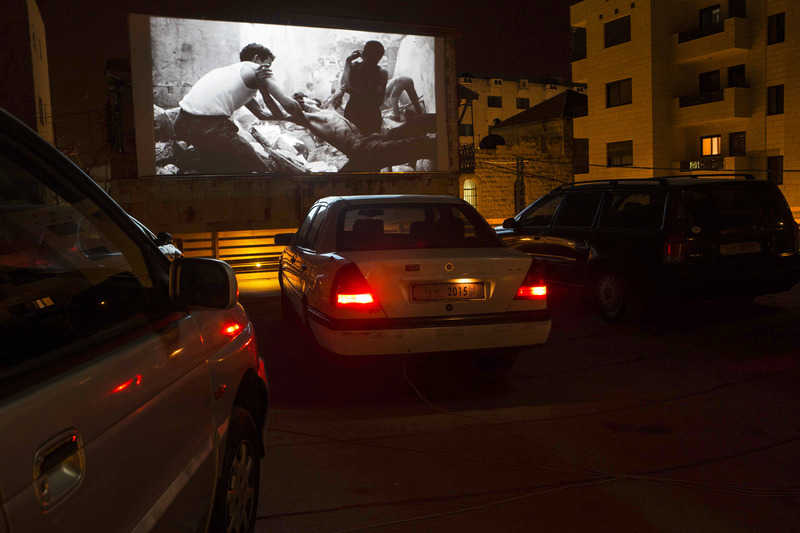The 5th Riwaq Biennale Palestine presents Cinema Sayyara! A project by Phil Collins.
Beit Saa, Ramallah at-Tahta
May 19 – June 16, 2015
9:00 PM daily
You are sitting in a car. Not your own car. You have no idea whose car this is. All you know is that it was lovingly placed on the rooftop of a historic building, here in downtown Ramallah. And that you’ve been watching a 1970s Egyptian Western. A French political musical. An experimental programme of artists’ film and video. The smell of popcorn fills the air, and the radio dial is a little buttery with your greasy fingerprints.
Cinema Sayyara! is a rooftop drive-in cinema by the artist Phil Collins, commissioned by the 5th Riwaq Biennale. It is the latest model of Collins’ Auto-Kino! which was rolled out in Berlin five years ago. The new film programme for Ramallah has been collectively selected by filmmakers, artists, artists’ collectives and curators whom Collins invited as guest programmers, as well as by residents of the Beit Saa neighborhood.
The project runs only for four weeks and offers a maximum of 21 seats per night. But if you live nearby, you can watch the programme from the street, your balcony or your favourite cafe by using a standard 98.9 FM frequency to tune into the soundtrack on the radio. The programme includes the following selections:
Phil Collins & Siniša Mitrović (Shady Lane Productions)
(The Battle of Algiers, Gillo Pontecorvo, 1967; I Am Cuba, Mikhail Kalatozov, 1964; Shadows of Forgotten Ancestors, Sergei Parajanov, 1964; The Umbrellas of Cherbourg, Jacques Demy, 1964)
Friends and families of the Beit Saa neighbourhood Islamic Youth Club
(Omar Mukhtar: Lion of the Desert, Moustafa Akkad, 1981; The Island, Sherif Arafa, 2007; Ramadan Mabrouk Abu al-Alalamein Hamouda, Wael Ehsan, 2008; Tom & Jerry, William Hanna and Joseph Barbera, 1940–1957)
Emily Jacir
(Tel el Zaatar, Mustafa Abu Ali, Pino Adriano, Jean Chammoun, 1977; The Dupes, Tawfiq Saleh, 1972; Of God and Dogs, Abounaddara Collective, 2014)
Hassan Khan
(Viva Zalata, Hasseb Hafez, 1976)
Subversive Films
(Hundred Faces for a Single Day, Christian Ghazi, 1971; Friendship’s Death, Peter Wollen, 1987)
Peggy Ahwesh
(Home Movies Gaza, Basma Alsharif, 2013)
Casey Asprooth Jackson
(Muslimgauze RIP, Hassn Khan, 2010; Jewel, Hassan Khan, 2010; The Slapper and the Cap of Invisibility, Hassan Khan, 2015)
Khadijeh Habashneh
(Children Nevetheless, Khadijeh Habashneh, 1984)
Oraib Toukan & Ala Younis
(A Voyage on the North Sea, Marcel Broodthaers, 1974; Shooting Stars Remind Me of Eavesdroppers, Maha Maamoun, 2013; Domestic Tourism II, Maha Maamoun, 2009; Private Life of a Cat, Maya Deren & Alexander Hammid, 1944)
Idioms Film
(Chicken Heads, Bassam Jerbawi, 2009; Carneval, Idioms Film, 2004; Pink Bullet, Ramzi Hazboun, 2014; Rico In the Night, Mohanad Yaqubi, 2007; Journey of a Sofa, Alaa Al-Ali, 2014; Though I Know the River Is Dry, Omar R. Hamilton, 2013)
Rasha Salti
(Birds of September, Sarah Francis, 2013)
Tirdad Zolghadr
(1972, Sarah Morris, 2008; marxism today (prologue), Phil Collins, 2010; use! value! exchange!, Phil Collins, 2010)
Cinema Sayyara! thinks through existing structures in order to produce new forms of public display and new audiences. Its host venue, Beit Saa, is a 1910 edifice newly renovated by Riwaq. Eventually, Beit Saa is planned to join the ranks of the many “museums” in Palestine. But instead of a homage to the past, in the name of some faraway future, Cinema Sayyara! proposes a celebration of the here and now, ready to spark a sense of curiosity, enthusiasm and collective ownership within the neighbourhood and beyond.
Technical manager/projectionist: Mazen Shahin
Installation and support: Al-Nasher, Ramallah
About Riwaq Biennale
The Riwaq Biennale is named after an institution, not a place. It was initiated in 2005 to expand upon Riwaq's approach aiming at the revitalisation of historic centres of 50 local towns and villages. In other words, this biennale comes with an agenda. It is invested in Riwaq's efforts to clarify the growing political and epistemic significance of architectural heritage in Palestine. With its concrete political outlook and its durational, discursive approach, Riwaq has always challenged what a biennale can be. This time, the 5th Riwaq Biennale is spanning an entire two years, beginning in June 2014 and ending in May 2016.
Khalil Rabah, Artistic Director – Riwaq Biennale
Tirdad Zolghadr, Curator – 5th Riwaq Biennale
Carol Michael Quffa, Programme Coordinator – 5th Riwaq Biennale
Reem Shilleh, Project Coordinator – 5th Riwaq Biennale

